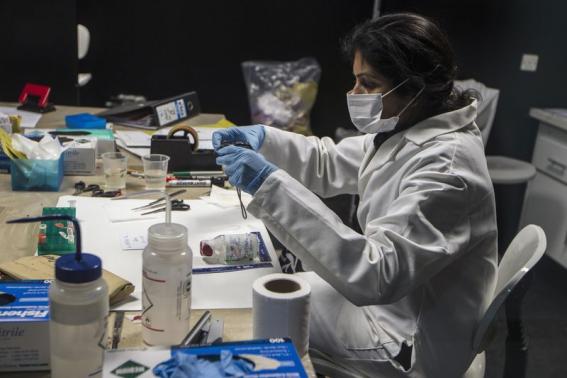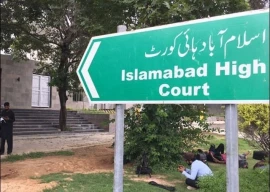
A forensic report has confirmed the presence of Bacillus anthracis, a soil-borne bacterium commonly known as anthrax, in the threatening letters sent to Lahore High Court (LHC) judges.
Bacillus anthracis, commonly found in animals, was identified within the letters, along with traces of arsenic totalling 70 mg, according to the forensic report.
The letters, which attempted to influence judicial decisions and criticised the judicial system while referencing Tehreek-e-Namoos Pakistan, were intended to intimidate the judges with the phrase "Welcome to Bacillus Anthrasis."
The revelation comes as preliminary inquiries had indicated that the envelopes did not contain anthrax. Instead, they were found to contain "carbohydrates with traces of arsenic."
However, there were widespread concerns regarding the presence of a suspicious powder believed to be anthrax.
Meanwhile, a team dispatched to Islamabad has gathered crucial evidence pointing towards potential suspects.
The authorities express confidence in identifying the culprits soon.
Tehreek-e-Namoos Pakistan first came into public awareness last September when a suspicious bag was discovered at an upscale hiking trail in Islamabad. The bag contained a letter, hand grenades, a pistol, bullets, and maps of sensitive buildings, alluding to intentions of causing harm to judges and military officials.
It is pertinent to note that authorities recovered ten more suspicious letters on Friday, some containing toxic substances and threatening content, addressed to various high-ranking officials including Prime Minister Shehbaz Sharif and Punjab Chief Minister Maryam Nawaz.
Of the ten letters, six were directed to Supreme Court judges, one to a Lahore High Court Justice, and the remainder to political figures. The investigation into these incidents remains ongoing.
Ten more suspicious letters, some of them laced with “toxic” powder and threatening writings, addressed to judges of the higher courts as well as Prime Minister Shehbaz Sharif and Punjab Chief Minister Maryam Nawaz were found by the authorities on Friday.
The 10 letters recovered on Friday, six were addressed to the Supreme Court judges, including Chief Justice Qazi Faez Isa, one to Justice Ali Baqar Najafi of the Lahore High Court (LHC), two letters addressed to Maryam Nawaz and one to Mr Sharif.
The five other letters received at the Supreme Court were addressed to Justices Mohammad Ali Mazhar, Ayesha A. Malik, Syed Hasan Azhar Rizvi, Irfan Saadat, and Munib Akhtar.
The letter to the LHC judge was received by his personal staff, whereas the four other letters were detected by the staff of a post office in Dhoke Gujran, a locality in Rawalpindi. However, no chemical or powder was found in the envelopes recovered from the letterbox of the post office in Rawalpindi.
Meanwhile, the office of the Director General Pakistan Post on Friday issued instructions to its staff regarding the handling of mail addressed to high-profile personalities.
The office directed all postmasters general to circulate an alert to all offices countrywide to take due care and be vigilant while handling mail addressed to high-profile offices in the wake of the suspected letters being delivered to the higher judiciary.
Moreover, it stressed that the safety and security of the postal operational staff is the prime responsibility and the first priority.
Besides, every necessary material which is required in such circumstances i.e., gloves, masks etc., should be provided to the staff involved in handling mail, and the mail articles brought in post offices after clearance of letter boxes should be carefully handled, the instructions issued by the office said.
If any unattended and suspected material is observed in the mail articles, it should immediately be reported to the supervisor on duty, local administration and the head of the unit and circle concerned.
Staff posted at counters and delivery post offices should also be directed to remain vigilant while booking, sorting, transmitting and delivering mail, it said.
It said the mail for the judges of Supreme Court, high courts, diplomats and other high-profile personalities should be examined carefully and should be delivered in the R&I section of the relevant office.
The directives have been issued to the postmasters general in Lahore, Multan, Rawalpindi, Karachi, Hyderabad, Islamabad, Peshawar, Quetta and Muzaffarabad.




1730959638-0/trump-(19)1730959638-0-165x106.webp)
















COMMENTS
Comments are moderated and generally will be posted if they are on-topic and not abusive.
For more information, please see our Comments FAQ